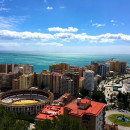Living like a local in "Grana" Granada Past Review
By Rachel Bornstein (University of Oklahoma) - abroad from 01/24/2018 to 05/26/2018 with
CEA CAPA Education Abroad: Granada, Spain
It may seem “easy” to just pack your bags, board the plane and daydream about the memories you will be creating abroad, and though fulfilling those dreams is important in the experience overall, the challenges you will face make up just as important a part of it as well. As an introvert, I learned it ESSENTIAL to put my needs first. A big piece of advice when studying abroad—do NOT compare your experience to the other people around you. It’s one thing to step out of your comfort zone, but you should never feel uncomfortable and insecure just to “fit in.” You are going to live like a local, not a tourist. I learned to have a nice balance between trying new things from a different culture while also selecting the aspects I loved about it to help mold MY perfect experience that suited MY tastes! I do not regret anything that happened abroad.
Review Photos





Personal Information
| How much international exposure did you have prior to this program? | 2 weeks - 1 month |
Review Your Program
|
* Overall educational experience
Academic rigor, intensity, resources, etc. |
The university really makes sure the placement test reflects the level from which you can grow from. I had a total of 4 classes and the professors really care about you getting the most out of the subjects! They know their subjects very well and understand how to teach international students in Spanish instruction— so you actually grow in immersion skills! There was not nearly as much "busy work" homework as we get in the US, which is really nice because a good grade basically depends on you paying attention to lecture, participating, and taking the exams. The rigor is NOT as tough as we know it in the US!!! The administration also knows we are international students who also want to explore and experience local culture, not just strictly be overloaded with homework. |
|
* Host Country Program Administration
On-site administration of your program |
Jorge, Antonio, and Begoña are SO sweet and very engaging with the students on site. They resolved a housing issue in less than a day which really effected my experience badly abroad in less than a day! They really do care about your happiness and comfort abroad. |
|
* Housing:
How satisfied were you with your living arrangements? |
I had two host families. It's VERY important to go abroad with an open mind related to the housing environment. For my first host-family, I lived in a pretty small flat—and this is normal according to other students. Bedrooms are smaller than we might be used to, and Spain puts importance on being conscious about not wasting food, water, etc. I had no problems with this— my main issue was my roommate. After CEA immediately responded to my issue and gave me a new host family, everything was different. My second host family was very privileged compared to the average Spaniard family I have met— my host mother was a professional chef with her restaurant below our apartment (which was a lot bigger). I got to eat amazing authentic Spanish seafood at her restaurant most Mondays! |
| * Food: |
If you go to Spain you are going to try some very different seafood dishes! Everything tastes so fresh and in Granada a lot of meals are CHEAP!!!!! I REPEAT, FOOD IS CHEAP. At night, the cultural norm is to go out with some friends for tapas, which consists of a drink and small appetizer-sized portion of food. TAPAS ARE FREE with a purchase of a drink in Granada! At some places, the tapas are selected for you, but at other places you get to choose what you want to eat! My second host-family introduced me to a native Andalusian dish— Salmorejo, which is a fresh cold tomato-based soup which is DELICIOUS. I learned how to make it and make it back at home now. **Tip: Bring cash for bars, and remember that it is NOT normal to split a check, so if you go with a group be prepared to receive one bill. |
|
* Social & Cultural Integration:
How integrated did you feel with the local culture? |
It sure helps to have a proficient level of Spanish to be able to navigate independently around Granada, since a lot of people do not know English. Back at home I typically do not party and stay out too late at night, so the most I would do in Granada was to hang out with some friends at a bar or get gelato late at night! I am also an introvert, and I feel like I can assure all other introverts out there that you should NOT feel pressured to make yourself uncomfortable just to "fit in." Studying abroad means to learn to live like a local, NOT a tourist. There is something for every type of person, and it is our job to take care of ourselves and happiness first before anything. Select the aspects of the new culture you love and learn to shape your unique experience! |
|
* Health Care:
How well were health issues addressed during the program? |
I got reimbursed both times I went to the hospital. The first time, the director Begoña went with me and I felt comfortable the entire time. The second time, I had to go alone which was really stressful because the hospital is run very differently! For one, unless it's critical, be ready to wait a long time. I entered the hospital and had no idea where to go and just kept asking employees who sent me back and forth. Basically, both appointments were about a new skin reaction I developed in Spain, which was sensitivity to the sun— I had to buy expensive medicated cream, which luckily was 100% reimbursed. |
| * Safety: |
Typically, Granada is a very safe place, but there is an area called the Albayzín, which has history amongst the Muslim community. The area has many winding and narrow paths, but you do NOT want to be alone there, especially as a girl. It is dangerous at night, so always be with friends when going out to dinner in that area. I got followed and hit on by this one man who insisted on me joining him to go to a strip club. In general, it is a cultural characteristic to witness what is called "machismo," a social construction where gender roles are still heavily prevalent. Spain also only recently ended its dictatorship in the 50's, so the situations of seeing immigrants is still new. Not that I felt racism or anything, but ALL THE MEN would stare at me without shame and flirt with me because I didn't look Spanish or white (I'm Asian). I felt sexualized, but I tried to understand the cultural and historical context to be able to tolerate it. |
| If you could do it all over again would you choose the same program? |
Yes
CEA planned out everything so well! The best thing is that they provide a good balance between independence and security/safety. The excursions are optional! I mean, if there is an excursion to tour another city or even country (we went to Morocco), take advantage and go to that! I go to see Seville, Ronda, and Córdoba with CEA. There was also an excursion to one of the most beautiful beaches in Spain— Nerja. You can be independent where you can skip excursions and even leave the country WHENEVER YOU WANT— even during the school week (provided you don't exceed your excused absences). You have to make sure you tell CEA where you will be each week if you are leaving the city but other than that you really are independent about what you want to make of your experience. |
Finances
|
* Money: How easily were you able to live on a student's budget?
(1 = not very easy/$200+ on food & personal expenses/week, 2.5 = $100/week, 5 = very easily/minimal cost) |
5 |
| Not including program expenses, about how much money did you spend on food and other expenses each week? | On weeks I did not buy clothes, 30 euros. |
| Do you have any general money-saving tips for future study abroad participants? | Live with a host family and do not try to eat at high-end looking restaurants. |
Language
| * Did your program have a foreign language component? | Yes |
|
How much did the program encourage you to use the language?
0 = No encouragement, 5 = frequent encouragement to use the language |
There are "intercambios" 'language-exchanges' every week. The group either meets at a bar or at the university and you can speak English/Spanish with a group of random people! The administration also speaks no English, so you're forced to speak Spanish. |
| How would you rate your language skills at the beginning of the program? | Advanced |
| How would you rate your language skills at the end of the program? | Advanced |
| What was the highest level language course you had completed prior to departure? | 4000+ |
| How many hours per day did you use the language? | |
| Do you have any tips/advice on the best ways to practice the language for future study abroad participants? | Do not hang around the party-group of Americans all the time. Talk to your host family as much as you can to form a bond. Do your shopping needs alone so you can force yourself to live like a local, talk to employees in Spanish, etc. Engage in your classes and if there is a class that is specifically about the Spanish language (The Diversity of Spanish in the World, Spanish Linguistics, etc.) TAKE IT. |
Other Program Information
|
* Where did you live?
Select all that apply |
|
|
* Who did you live with?
Select all that apply |
|
|
* Who did you take classes with?
Select all that apply |
|
| About how many local friends did you make that you will likely keep in touch with? |
A Look Back
| * What did you like most about the program? |
|
| * What could be improved? |
|
| * What do you know now that you wish you knew before going on this program? | I really prepared myself before leaving by looking up as many things as I could about gong abroad to Spain on Google. Maybe other people did not know that the sociocultural interactions would be very different (staring, sexual harassment—in our perspective—, flirting, etc). |
Reasons For Studying Abroad
| To help future students find programs attended by like-minded individuals, please choose the profile that most closely represents you. |
The Academic or LinguistYou went abroad with specific academic goals in mind; the program credentials and rigor of your coursework abroad were very important to you. You had a great time abroad, but never lost sight of your studies and (if applicable) were diligent with your foreign language study. Good for you! |
Individual Course Reviews
| Course Name/Rating: |
Diversity of Spanish in the World |
| Course Department: | Spanish |
| Instructor: | Rosa María Torres |
| Instruction Language: | Spanish |
| Comments: | Señorita Torres teaches both the Diversity of Spanish in the World and Spanish Linguistics, of which I took both with her! Torres really wants students to learn as much important information as possible, and I wouldn't say anything she spoke about was unnecessary. The Diversity of Spanish in the World is a class I would recommend to Spanish majors/minors or anybody wanting to improve their Spanish. It's one thing to learn and use what you learned from your education in the USA, but it's a whole NEW level to be able to understand the differences and variations amongst grammar and phonetics in different Spanish-speaking countries and their regional dialects. This class made me consciously able to identify Granada's very distinct way of speaking as well as helping to shape my accent to match theirs! A part from learning the variations of accents, we also learn how one word can mean TONS of different meanings depending on the country, colloquial expressions special to a country, and the social differences of how the lower class speaks. We didn't do a research assignment, but each of us had to look up unique dialectal characteristics, colloquialism and culture of a Latin American country, which is nice in helping you better understand the diversity of the Spanish-speaking world. Torres' exams are NOT something you can study the night before for. Her exams are strongly retention-based and require you to be able to write out as much as you can pertaining to the question. It is overwhelming but the effect in the long run is important in proving to yourself how much you learned about Spanish, which is nice!!! |
| Credit Transfer Issues: | My university had not set an equivalency for this class before I went, but now there is!! For the University of Oklahoma, I think this class got counted for a major class— Teaching Spanish in the US. This class can definitely be an upper division elective credit for Spanish majors/minors as well. If your university has not reviewed this class yet, just make sure you understand the rules about requesting a class to be equated for credit and talk to your academic advisor AND head of department for your major. |








